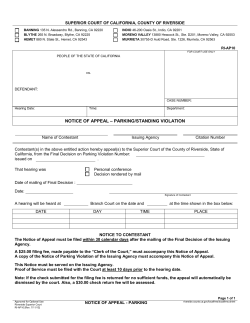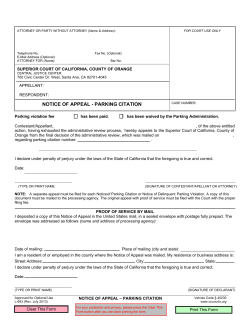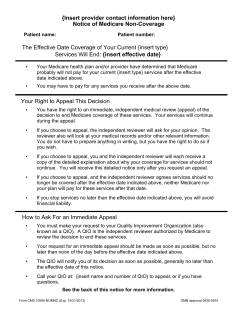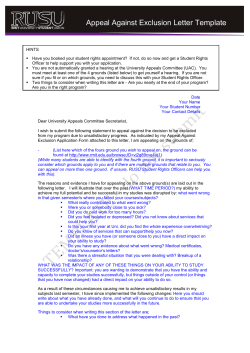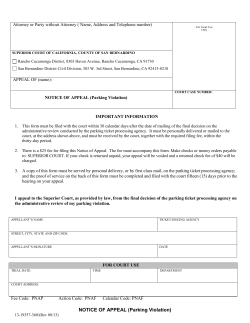
HOW TO REPRESENT BEFORE CIT(A) Presented by : CA Sanjay Kumar Agarwal
HOW TO REPRESENT BEFORE CIT(A) Presented by : CA Sanjay Kumar Agarwal Mb. : 9811080342 e-mail id : agarwal.s.ca@gmail.com “Meaning of Appeal” In Wharton’s Law Lexicon – the word “appeal” is defined as the judicial examination of the decision by an higher court of the decision of an inferior court. “Right to Appeal” ¾ ¾ A right to appeal is not merely a matter of procedure. It is a matter of substantive right. That a right of appeal is a valuable right and unless expressly taken away or abandoned, it cannot be held that the assessee has abandoned or lost such right by implication. [ Indian Alluminium Co. ltd. vs. CIT (1986) 162 ITR 788 (792) (cal.)]. Issues Mico Employees Association vs. Assistant Commissioner of Income-tax (TDS) (Karnataka High Court) [2007] 292 ITR 0567. Employees association not entitled to appeal, that though to a certain extent the association might be an aggrieved party it was not an assessee in terms of the definition in section 2(7) of the Act. Hence, no appeal could have been filed by the appellant in terms of the statute. S. 246A to 250 Appeal before Commissioner of Income Tax – (Appeals) Section – 246A, Appealable Orders An Assessee aggrieved by any of the following orders may appeal to CIT(A) : ¾ ¾ ¾ Order passed by JCIT u/s 115VP(3)(ii). An order against the assessee, where the assessee denies his liability to be assessed under this Act. Intimation passed u/s 143(1) or 143(1B). PRESCRIBED ORDERS ALONE ARE APPEALABLE Contd……. Section – 246A, Appealable Orders ¾ ¾ Order passed u/s 143(3) [except an order passed in pursuance of directions of the Dispute Resolution Panel] (insertion by Finance (No. 2) Act,2009 w.e.f. 1-10-2009 ) or section144. Order of assessment passed u/s 115WE(3) or 115WF, where the assessee, being an employer objects to the value of fringe benefits assessed. PRESCRIBED ORDERS ALONE ARE APPEALABLE Contd……. contd…… ¾ ¾ ¾ An order of assessment or reassessment u/s 115WG. Order of assessment, reassessment or recomputation u/s 147 [except an order passed in pursuance of directions of the Dispute Resolution Panel] (insertion by Finance (No. 2) Act,2009 w.e.f 10-2009) or section150. An order of assessment or reassessment u/s 153A. Contd……. contd…… ¾ Order u/s 154 or 155, having the effect of enhancing the assessment or reducing a refund or an order refusing to allow the claim made by the assessee under either of the said sections. ¾ An order made u/s 163 treating the assessee as the agent of a non resident. Contd….. ¾ ¾ ¾ ¾ Order u/s 170(2) or 170(3). Order u/s 171. Order u/s 185(1)(b) or 185(2) or 185(3) or 185(5) in respect of an assessment for the assessment year commencing on or before 1/04/1992. An order canceling the registration of a firm u/s 186(1) or 186(2) in respect of any assessment for the assessment year commencing on or before 1/04/1992. PRESCRIBED ORDERS ALONE ARE APPEALABLE Contd….. Contd…. ¾ ¾ ¾ ¾ ¾ Order u/s 201. Order passed u/s 206C(6A). Order u/s 237 Against an order imposing penalty u/s 221, 271, 271A,271AAA, 271F, 271FB, 272AA, 272BB. Against an order imposing penalty u/s 272, 272B or 273 in respect of any assessment for the assessment year commencing on or before 01/04/1988. PRESCRIBED ORDERS ALONE ARE APPEALABLE Contd….. contd…… ¾ ¾ ¾ ¾ An order imposing or enhancing penalty U/s 275(1A) on the basis of assessment as revised by giving effect to order of CIT(A), ITAT, High Court or SC or order of revision u/s 263 or 264 Order passed u/s 158BC(c.). Order imposing penalty U/s 158BFA(2). Order imposing penalty u/s 271B or S. 271BB. Contd…. ¾ ¾ ¾ ¾ Order made by DCIT imposing penalty u/s 271C, 271CA, 271D, 271E. An order imposing penalty made by DCIT or DDIT u/s 272A. Order passed by DCIT u/s 272AA. Order imposing penalty under chapter XXI. PRESCRIBED ORDERS ALONE ARE APPEALABLE Contd… Contd…. ¾ Order of AO other than DCIT in the case of person or class of persons, as the board may, having regard to the nature of the cases, the complexities involved and other relevant considerations direct. Contd… S. 246A, Important features…. ¾ upon aggrieved assessee may file an appeal However, appeal may be filed by a person other than the aggrieved person in following cases: • In the case of adverse order passed in the matter of deceased person, his legal heirs can file appeal. • In case of HUF, karta can file appeal. However, after partition, if any adverse order is passed in respect of pre-partition HUF, erstwhile coparceners can prefer an appeal. S. 246A, Important features…. ¾ appeal may be preferred as provided under this section are exhaustive and not inclusive. ¾ In other cases constitutional remedy as permitted under articles 32 and 226 of the constitution is available. ¾ Right to appeal is notwithstanding any remedy availed by way of a rectification petition u/s 154 & or 155. Issues [2009] 185 TAXMAN 274 (RAJ.) Vijay Solvex Ltd.v Union of India Assessee filed writ petition challenging assessment order passed by Assessing Officer under section 143 on certain grounds - Whether since assessee had approached High Court without availing remedy of an appeal available under section 246, there was no justification to entertain writ petition - Held, yes Issues Balmukund Acharya v. DCIT [2009] 176 Taxman 316/310 ITR 310 (Bom.) If appeal is not maintainable, it is not maintainable at all; it cannot be said that for a particular ground, an appeal is maintainable and for another it is not. Issues Dr. A. Naresh Babu v. ITO [2009] 123 TTJ(Hyd.)836 Appeals are maintainable from fresh orders passed by AO to give effect to a revisional order passed u/s 264 but only such issues can be agitated in such appeals,which have not attained finality by virtue of order passed u/s 264 or earlier orders. S. 248, No liability to deduct tax. ¾ Applicable – where any person responsible for paying to a non resident or a foreign company, any income chargeable under the Act other than interest, denies his liability to deduct any tax in accordance with provisions of S. 195 and 200, after having paid such tax to the credit of Central government. ¾ An order passed u/s 195(2) is an appealable order under this section. ¾ Person as referred above, before filling the appeal under this section, has not only to deduct the tax but also to deposit the same. Issues CIT(International Taxation) v. Samsung Electronics Co. Ltd.(2009) 185 Taxman 313 (Kar.) Whether an erroneous order and demand being raised by Assessing Officer under section 201, such as an incorrect description of resident payer or incorrect computation of amount to be deducted from payment made by resident payer either by employing a wrong percentage for deduction at variance with rate as indicated in Finance Act or such arithmetical or factual errors committed by Assessing Officer, without involving question of actual determination of tax liability of non-resident,etc., can constitute subjectmatter for appeal under section 246A - Held, yes S.249 (1), Form of appeal ¾ Form of Appeal – Form No. 35. (Rule 45). ¾ Verification - By person competent to sign the return under provision of section 140. ¾ Authorized representative may sign the appeal form only if POA is executed in his name. contd….. ¾ Form 35 should accompany with • Memorandum of appeal, • Statement of facts, • Grounds of appeal, • Certified true copy of order appealed against. • Demand notice in original. • Challan of proper fees in original. • Two sets of Form No. 35 should be prepared. Any irregularity in filling these documents is merely an irregularity which can be cured. Issues Additional Commissioner of Income-tax vs. Prem Kumar Rastogi (Allahabad High Court) [1978] 115 ITR 0503 Neither section 249 of the Income-tax Act, 1961, nor rule 45 of the Income-tax Rules, 1962, makes it incumbent on the assessee to enclose the demand notice along with the memo of appeal. The assessee may enclose the demand notice in order to demonstrate that the appeal is within time; but failure to do so would not render the appeal beyond limitation, if it is otherwise within time S. S.249 (1), Fees for filling Appeal. ¾ ¾ ¾ ¾ Rs. 250, where total income assessed by AO is Rs. 100000/- or less. Rs. 500, where total income assessed by AO is more than Rs. 100000/- but up to 200000/-. Rs.1000, where total income assessed by AO is more than Rs. 200000/-. Rs.250, In any other case. S.249 (2), Time limitation. Time to file Appeal- within 30 days of: • the date of payment of tax- where the appeal is filed u/s 248 [sec. 249(2)(a)] • date of service of notice of demand-where appeal relates to any assessment or penalty. [249 (2)(b)] • date on which the intimation of the order sought to be appealed against is served if it relates to any other cases [249(2)(c)] ¾ Exclusion for calculating the time limit ¾ S. 268 – the day of service of order complained of has to be excluded from the limitation. ¾ Period taken for obtaining the order where the assessee was not furnished with the same when the notice of demand was served upon him, shall be excluded from the limitation. ¾ Where an application has been made u/s 146 for reopening an assessment, the period from the date on which application is made to the date on which order passed on the application is served on the assessee shall be excluded. (proviso to sec. 249(2)(b) Contd…… contd…… ¾ In case appeal is sent by post, the date of filling shall be the date on which the memorandum was received in the office of the concerned officer. ¾ Holiday – in case the last day of limitation is holiday the appeal can be filed on the immediate next working day and the same shall not be barred by limitation. ¾ The Notice of demand issued u/s 156 specifies the particulars with whom the appeal has to be filed however in absence of the same appeal should be filed with Jurisdictional Commissioner (Appeals) only. Issues CIT v. Prem Kumar Rastogi[1980] 124 ITR 381(All.) Where the assessment order was served on a person who was not an authorised agent of the assessee, and later on, the assessee applied for and obtained a copy of the assessment order for the purpose of filing an appeal , it was held that the time limit for filing the appeal should be reckoned from the date on which the assessee obtained the copy of assessment order and notice of demand and not from the earlier date of service of the assessment order. S.249 (3), Condonation of delay. ¾ In case appeal is preferred beyond the limitation date, a request for condonation of the delay as also the reasons for the delay has to be attached with the memorandum of appeal. ¾ Condonation of delay is wholly and exclusively a matter of discretion of CIT (Appeals). ¾ CIT(A) may admit an appeal after expiration of the prescribed period, if he is satisfied that the appellant had a sufficient cause for not presenting the appeal within time. ¾ The sufficiency of cause for delay in filling the appeal is a question of fact and not a question of principle. contd….. ¾ In case of small delay say 2-3 days, CIT is not expected to state the reasons for such condonation. However where the delay is grave, the reasons for condonation should be specifically recorded. ¾ If CIT(A) refuses to condone the delay, he should give reasons for not accepting the explanation of the appellant by a speaking order. Issues In Poonam Industries v. CIT[2009] 178 Taxman 319 CIT (P & H) Whether though a party is required to explain each day’s delay and to show that it was prevented by sufficient cause in filing appeal in time, yet power to condone delay has to be exercised in a pragmatic manner to advance substantial justice Held, yes – Whether where plea of illness of one of partners of assessee-firm was not fake, delay in filing appeal could not be denied to be condoned on ground that other partners could have pursued appeal, inasmuch as every partner may not be aware of all affairs of firm - Held, yes S.249 (4), Payment of admitted Tax. Admitted tax should be paid before filling Form No.35. ¾ Specific clause incorporated in Form no. 35 about payment of admitted tax, however in case of any erroneous statement in this regard may lead to initiation of prosecution u/s 277. ¾ The provisions are related only to the extent of undisputed demand. ¾ The proviso to this sub section empowers the CIT(A) to exempt the appellant for reasons to be recorded in writing, from payment of taxes in a case where no return is filed. ¾ Issues ¾ The expression admitted tax, if include tax and interest is a debatable issue and law is not yet settled. ¾ If the assessee is entitled to be reheard on merits after he has paid the admitted taxes. This issue is also debatable issue. Issues CIT vs Manoj Kumar Beriwal[2008] 217 CTR 407 Beriwal (BOM.): Expression ‘tax’ does not include interest for purpose of section 249(4). The expression tax has been defined in section 2(43). Tax as per the definition does not include interest which has been independently referred to under section 2(28A). In these circumstances, the expression ‘tax’ does not include interest for the purpose of section 249(4). Appeal not maintainable…. Appeal may be non maintainable on account of one or more of the forgoing reasons. a) Appeal being barred by limitation and delay is not condoned. b) Non payment of admitted taxes. c) Unsigned appeal or incorrect verification. Issues Non-payment of admitted tax vis-a-vis applicability of section 249(4)(a) CIT v. Pawan Kumar Laddha (2010) 33 (I) ITCL 491 (SC) The expression "this chapter" in section 249(4) confies to Chapter XX-A without it being extended to section 253(1)(b) which is there in Chapter XX-B. Further, under the scheme of Chapter XX, no appeal under section 249(4)(a) in Chapter XX-A is admissible without the assessee having paid the admitted tax due on the income returned by him. It appears that once section 249(4)(a) is treated as a mandatory condition for filing an appeal before CIT(A) and once that condition stood satisfied at the time of his filing an appeal to CIT(A), then, there was no necessity for the assessee to once again pay the admitted tax due as a condition precedent to his filing the appeal before the Tribunal under section 253(1)(b) of 1961 Act.- Issues Cairn Energy India West BV v. ADIT [2010]3 Taxman.com 94(Ahd.-ITAT) ITA Nos. 86,457 & 459/Ahd./2010 Mere fact that assessee has not stated date in appeal(s) memo and appeals were filed by scanned– signature, appeals can only said to be irregularity/defective and same is curable one Once the assessee has filed fresh appeal(s) memo which borne the signature in ink, date and place, etc., the CIT (Appeals) ought to have treated that defects removed. Issues RajendraKumar Maneklal Sheth (HUF) v. CIT (1995) 213 ITR 715 (Guj.) If the appeal is unsigned or unverified, or is signed or verified by a wrong person, that would be a curable defect and in appropriate cases, an opportunity should be given to the assessee to rectify it. Issues Shyam Electric Works vs. Commissioner of Income-tax (Madhya Pradesh High Court) [2006] 284 ITR 0413 If the assessee makes an application as contemplated under the proviso to sub-section (4) then it is the duty of the Commissioner (Appeals) to pass an appropriate order on the application so made by either granting an exemption from payment of tax or refusing the prayer. Depending upon the outcome of the application, the Commissioner (Appeals) has to proceed. Issues Commissioner of Income-tax vs. Rama Body Builders (Delhi High Court) [2001] 250 ITR 0825 Before the issue of the show-cause notice, the assessee had made the deposit. The proviso to sub-section (4) of section 249 permitted deposit of deficit tax in case it had not been done earlier. Therefore, the appeal of the assessee was to be heard on the merits. Issues Manmala Exhibitors vs. Joshi (M.C.), Commissioner of Income-tax (Bombay High Court) [2002] 257 ITR 0563. The Commissioner (Appeals) dismissed the assessee’s appeal at the threshold for noncompliance with section 249(4)(a) under which it was mandatory on the part of the assessee to pay the tax due on the income returned by him. Thereafter, the assessee filed a revision petition under section 264 before the Commissioner which was dismissed by the Commissioner both on the ground of maintainability as well as on the merits, the revision petition was clearly barred under section 264(4)(c) of the Act, as remedy to appeal was chosen. S. 250, Procedure in Appeal ¾ After appeal being filed, papers are examined on technical grounds. ¾ The Date day and place of hearing is fixed and intimated. ¾ Assessee and Assessing officer may represent in person or through authorized representative provided u/s 288 of Income Tax Act, 1961. [sec.250(2)] S. 250, Procedure in Appeal ¾ The power to adjourn is the absolute prerogative of the CIT(A) who may adjourn the matter on the facts and circumstances of the case.[sec. 250(3)] ¾ Written submissions being filed by assessee before CIT(A) may be referred to Assessing officer for his comments, his comments are received by CIT(A) in the form of remand report, which is thereafter forwarded to the appellant for his further comments, however it is not necessary that every comments of assessee shall be sent to AO. S. 250, Procedure in Appeal ¾ CIT (A) may make further inquiries either himself or through the Assessing officer for the proper disposal of appeal.[sec. 249(4)] ¾ CIT(A) may permit the assessee to raise additional ground if he is satisfied that the omission of that ground from the form of appeal was not wilful or unreasonable, where such ground of appeal could not be raised earlier and that the same has became available only on account of change in circumstances or law.[sec 249(5)] Case Law :Jute Corporation of India Ltd. Vs. Commissioner of Income-tax [1991] 187 ITR 688 (SC), Commissioner of Income-tax vs. Gokuldass and Co. (Rajasthan High Court) [2002] 253 ITR 0633. S. 250, Procedure in Appeal ¾ Assessee may rely on certain evidences, documentary or otherwise, which could be filed under rule 46A of Income Tax Rules, 1962.(discussed later) ¾ The order of CIT(A) should be in writing and should state the point of determination, decision thereon and reasons for such decision, decision should be firm and clear and should be given on all grounds of appeal.[sec. 250(6)] ¾ Where a subject matter of appeal is same, a consolidated order may be passed by the CIT(A) for different assessment years. S. 250, Procedure in Appeal ¾ A discretionary time limit of one year from the end of the financial year in which appeal is filed u/s 246A has been specified for the hearing and decision of the appeal.[sec. 250(6A)] ¾ An order disposing the appeal should be sent to the assessee and also to the CCIT or CIT as the case may be.[sec. 250(7)] ¾ In an appeal against assessment order,the CIT(A) may either confirm or reduce or enhance or annul the assessment . S. 251, Powers of CIT(A). ¾ CIT (A) no more has power to set aside the case. ¾ In an appeal against the order of assessment in respect of which the proceeding before the Settlement Commission abates under section 245HA, he may, after taking in to account all the material made available before Settlement Commission and such other material as may be brought on his record, confirm, reduce, or annul the assessment. ¾ In an appeal against the penalty order, he may confirm or cancel such order or vary it so as either to enhance or to reduce the penalty. S. 251, Powers of CIT(A). ¾ In any other case he may pass the order, as he may think fit. ¾ While giving effect to an order of CIT(A) the assessing officer cannot alter any other point on his himself and where the AO gives incorrect or incomplete appellate effect, the proper remedy will be to apply for a rectification u/s 154. ¾ The Powers of CIT(A) are co terminus with that of Assessing officer. Issues Goel Die Cast Ltd. vs. Commissioner of Income-tax (Appeals) (Punjab and Haryana High Court) [2008] 297 ITR 0072 S. 251 defines powers of the Commissioner (Appeals) to confirm, reduce, enhance or annul an assessment. The only pre-condition mentioned for exercising the powers to enhance the income is that it can be done only after providing adequate opportunity of hearing to the assessee. There is no restriction under the Act that the information, which can form the basis for enhancement of income, cannot be sourced from the Assessing Officer. The power to enhance income can be exercised by the Commissioner (Appeals) even on information furnished by the Assessing Officer. More cases for reference : Commissioner of Income-tax Vs. Lotte India Corporation Ltd [2007] 290 ITR 248 (Mad.) Issues Commissioner of Income-tax Vs. Union Tyres (Delhi High Court) [1999] 240 ITR 0556. That it is not open to the Appellate Assistant Commissioner to introduce in the assessment a new source of income and the assessment has to be confined to those items of income which were the subject-matter of original assessment. and, therefore, it was not open to the first appellate authority to direct the Assessing Officer to conduct enquiry about such new source of income. Paulsons Litho Works vs. Income-tax Officer (Madras High Court) [1994] 208 ITR 0676. CIT (Appeals) has inherent power to stay recovery proceedings. Issues Can CIT(A) discover new sources of Income Power of CIT(A) is co-terminus with that of the Assessing Officer.He can do what the assessing officer can do and also direct him to do what he failed to do.However CIT(A) cannot discover new sources of income. CIT v. Kanpur Coal Syndicate[1964] 53 ITR 225 (SC). Rule 46A, Additional Evidence before CIT(A). The appellant shall not be entitled to produce before the Commissioner (Appeals)] any evidence, whether oral or documentary, other than the evidence produced by him during the course of proceedings before the Assessing Officer, except in the following circumstances, namely : (a) if the AO has refused to admit evidence which ought to have been admitted. (b) where the appellant was prevented by sufficient cause from producing the evidence which he was called upon to produce by the AO. Rule 46A, Additional Evidence before CIT(A). where the appellant was prevented by (c) sufficient cause from producing before the Assessing Officer any evidence which is relevant to any ground of appeal. (d) where the AO has made the order appealed against without giving sufficient opportunity to the appellant to adduce evidence relevant to any ground of appeal. Rule 46A, Additional Evidence before CIT(A). • CIT(A) should record reasons in writing before admitting additional evidence. • AO should be provided a reasonable opportunity to examine the evidence or document or to cross-examine the witness produced by the appellant. • AO should be provided a reasonable opportunity to produce any evidence or document or any witness in rebuttal of the additional evidence produced by the appellant. Contd….. • However Commissioner (Appeals) has power to direct the production of any document, or the examination of any witness, to enable him to dispose of the appeal, or for any other substantial cause including the enhancement of the assessment or penalty • The CIT(A) may direct the production of any document, or the examination of any witness,to enable him to dispose of the appeal, or for any other substantial cause including the enhancement of the assessment or penalty (whether on his own motion or on the request of the AO.)u/s 251(1)(a) or imposition of penalty u/s 271. Issues CIT vs Shri Kangra Steel (P.) Ltd. [2010] 188 TAXMAN 392 (HP) rule 46A(3) is a mandatory provision and non-compliance of same would vitiate order itself where assessee had produced additional evidence before Commissioner (Appeals) not on direction of Commissioner (Appeals) but by itself and Commissioner (Appeals), on being satisfied with assessee’s explanation regarding nonproduction of that evidence before Assessing Officer, had permitted assessee to lead evidence in terms of sub-rule (3) of rule 46A, he was bound to give an opportunity to Assessing Officer to examine documents and to produce any evidence to contrary, if he so desired Issues Income-tax Officer vs. Industrial Roadways (Income-tax Appellate Tribunal--Mumbai) [2008] 305 ITR (A.T.) 0219. Where the additional evidence is obtained by the first appellate authority on its own motion, there is no requirement in law to consult or confront the Assessing Officer with such additional evidence. In cases where additional evidence is admitted by the first appellate authority on a request or application being made by the assessee, sub-rule (2) of rule 46A requires the first appellate authority to allow the Assessing Officer a further opportunity to rebut the fresh evidence filed by the assessee. Even that requirement cannot be said to be a rule of universal application. If the additional evidence furnished by the assessee before the appellate authority is in the nature of clinching evidence leaving no further room for any doubt or controversy no useful purpose would be served in performing the ritual of forwarding the evidence or material to the Assessing Officer and obtaining his report. In such exceptional circumstances the requirement of sub-rule (3) may be dispensed with. Issues ITO v. Prem Kumar Jindal[2009] 27 SOT 228(Chd.) merely because additional evidence sought to be produced by assessee was forwarded by CIT(A) to AO for his specific comments, that would not meet the requirement of Rule 46A as specifically laid down in sub-rule(2) thereof. The control over the power of CIT(A) to admit additional evidence in terms of sub- rules (1) to (3) does not effect the power of CIT(A) provided in subrule (4) of rule 46A. Issues Commissioner of Income-tax vs. Poddar Swadesh Udyog P. Ltd. (Gauhati High Court) [2007] 295 ITR 0252. The Commissioner is also entitled to admit additional evidence which he may think necessary for facilitating further enquiry. The powers of the Commissioner (Appeals) are undoubtedly very wide. Even otherwise, the powers of a statutory appellate authority are coterminus with the powers of the authorities at the first instance. More cases : Commissioner of Income-tax vs. Parimal Kanti Chanda (Gauhati High Court) [2007] 291 ITR 0077 Issues Commissioner of Income-tax vs. Ranjit Kumar Choudhury (Gauhati High Court) [2007] 288 ITR 0179. Additional evidence should be admitted under proper and satisfactory reasons recorded in writing further AO should be given an opportunity of being heard. Tips for Representation and Pleadings PRECAUTIONS IN FILING OF APPEAL ¾ Ground of Appeal should not be Argumentative. ¾ All grounds relating to mat, bf loss, set off of loss, untenable looking claims, DVO appointment, opportunity of hearing, denial of liability to be alternative claims, challenging assessment legally taken ¾ Ground taken can be withdrawn at any time as on day reopening, assessed, should be Precaution during representation ¾ Written submissions preferably be filed, however it is not necessary. ¾ Instant query should be answered on spot, if possible. ¾ Paper book containing pleadings and evidences placed before assessing officer, be file. ¾ Past history-an important evidence-but to be used carefully at this stage. ¾ Representation of information based on information already filed is possible. ¾ Details given in past assessment can be made part of paper book. ¾ Procedure for representation - Argument by appellant, than reply by defendant there upon rejoinder by appellant. Do’s……. ¾ File Power of attorney. (CA has to file its POA at stamp paper of Rs. 50, however stamps could not be used to pay court fee, An Advocate may file POA with stamp of Rs. 13.50/- stamp paper not required.) ¾ Give due importance to facts. ¾ Furnish paper book. ¾ File affidavit, where ever required. ¾ Get acquainted with the latest law and decision, also see judgments in against. ¾ Facts in against should be recollected and points to defend the same should be determined. ¾ Use tact – You must know how the judge reacts to your argument. ¾ Act solely on reason not on emotion. Do’s……. ¾ Be courteous. ¾ Be fair. ¾ Should have good sense of humour. ¾ Be reasonably brief. ¾ Make the arguments in summarized manner. ¾ Show importance to authorities. ¾ Ensure to be in proper dress. – Male : a suit with tie or buttoned – up coat over a pant or national dress, i.e. a long buttoned – up coat on dhoti or churidar pyjama. The color of the coat shall be preferably be black. – Femal : Black coat over white or any other sober colored saree. Don’t’s ¾ Ignore summons or notices. ¾ Take adjournment – on frivolous basis. ¾ Lie – Statement can be recorded on Oath. ¾ Mislead. ¾ loose temper, keep calm even in difficult situations ¾ Don’t make haste, proceed carefully observing the mood of the authority. THANK YOU!!! By: CA. Sanjay K. Agarwal email: agarwal.s.ca@gmail.com Mobile No. : 9811080342
© Copyright 2025



